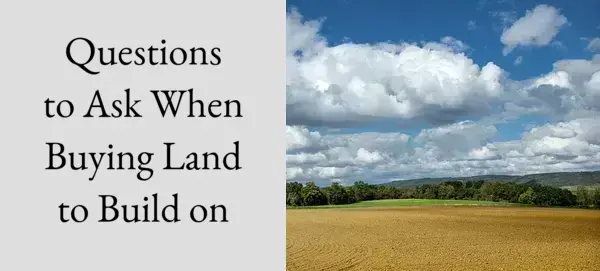When it comes to purchasing land to build on, there are a plethora of factors that need to be taken into consideration. Whether you are looking to build your dream home, start a new business or simply invest in a piece of property, the process can be daunting.
To ensure that you make an informed decision, it is important to know what questions to ask when buying land. In this article, we will explore some critical questions that you should consider before making any commitments.
Questions to ask when buying land for construction
When it comes to buying land for construction, there are a number of important questions you need to ask to ensure you make the right decision. First and foremost, you need to determine if the land is suitable for building. This means considering things like the topography and soil conditions. You also need to check what type of construction is permitted in the area and whether there are any barriers or restrictions to building.
Next, it’s important to determine whether the land can support stable construction. This means assessing the foundation and ensuring it can support the weight of the building you want to construct. You also need to consider the legal requirements for building and whether the land is licensed for construction purposes. You should ask the owner why they are selling the land and request any relevant documents, such as survey reports and ownership documents.
Lastly, it’s important to consider the distance from the land and what building systems are allowed in the area. Remember, buying land for construction is a big investment, so take the time to ask these important questions and do your due diligence before making any commitments.
1. Is the plot suitable for building?
When it comes to buying land for construction purposes, the first and most crucial question to ask is, “Is the plot suitable for building?” This question can save you from investing money in land that is unsuitable for your construction plans. To determine the suitability of the plot for building, you need to follow some steps.
First, check if the land has good functional utilities such as water, electricity, and waste disposal system. Additionally, assess if the land has adequate road frontage or a suitable right-of-way for building.
Also, inquire if there are any building restrictions or limitations around the property.
Furthermore, consider the topography of the land and whether it’s flat or sloped, as this will affect the cost of construction.
Another factor to look into when assessing the land’s suitability for building is its zoning designation, which will tell you its intended use. For instance, agricultural or residential.
By asking these vital questions, you can determine if the plot is suitable for your construction needs. Remember, a suitable plot is a crucial aspect of a successful home-building project.
2. What type of construction is permitted?
Now that you have checked if the land is suitable for construction, it’s essential to know what type of construction is permitted. Every area has its building codes and bylaws that specify the type and size of construction allowed. You should research and understand what type of building you can construct, including the height and size restrictions. Some locations may have zoning laws that prohibit commercial or industrial construction, so it’s crucial to know the land’s permitted usage.
Additionally, if you have specific construction plans in mind, assess whether they align with the local laws and regulations. Some areas may require specific building materials, architectural styles, or energy-efficient designs. You must know what building systems are allowed before investing in the land.
In conclusion, determine the type of building suitable for the land before acquiring it. Knowing what type of construction is permitted will save you time and money in the long run. Ensure that your proposed construction aligns with the zoning laws and building codes. If you need clarification, consult with local authorities or hire a lawyer to help interpret the regulations. With this knowledge, you are one step closer to creating your dream home or project.
3. Are there barriers to building on it?
When buying land to build on, you must ensure that there are no barriers that may prevent you from constructing your dream home. Start by determining the type of construction permitted on the land and whether local zoning regulations allow it. If there are any restrictions, such as height or size limitations, you must consider if they align with your vision for your building project.
It’s also important to consider any potential physical barriers on the land. Check if the soil is stable and if it can support the weight of your building, as building on unstable soil can result in structural damage. Terrain, vegetation, and even nearby water sources may also affect the land’s suitability for construction.
Do not forget to check for legal barriers, such as liens or restrictions that could hinder the transfer of ownership or the building process. This can save you a lot of trouble down the line.
When assessing the land for any barriers, it’s important to understand why the owner is selling the land. If the owner has faced any issues with the land that prevented them from building, it’s essential to be aware of them so that you do not inherit the same issues. Finally, ensure that all necessary documents related to the sale and transfer of ownership are requested and reviewed.
In conclusion, by considering all the relevant factors outlined above, you can avoid any barriers that may prevent you from realizing your dream building project. Make sure to thoroughly investigate the land to ensure that it meets all your requirements and that potential barriers are identified and resolved before purchasing.
4. Can the land support stable construction?
When considering buying land for construction, one of the most important questions to ask is whether the land can support stable construction. This includes taking into account the soil type, slope, and drainage of the land. A unstable foundation can lead to costly repairs and even collapse of the building.
To determine if the land is suitable for stable construction, it’s important to work with a surveyor or engineer to conduct a soil analysis and assess any potential risks. Factors such as erosion, flood zones, and seismic activity should also be taken into account.
If the land does not meet the requirements for stable construction, it’s not necessarily a deal breaker. It may be possible to address any issues through foundation design, drainage systems, or other methods. However, it’s important to factor in the potential cost and time required to address these issues before making a decision to purchase the land.
Don’t compromise on the stability of your future home or building by overlooking this crucial question. With careful consideration and the right experts by your side, you can ensure that your land is suitable for stable construction and avoid any future headaches.
5. What are the legal requirements for building?
To ensure that your construction project goes smoothly, it’s essential to understand the legal requirements for building on your chosen plot of land. Start by researching and understanding local zoning laws, building codes, and permit requirements in the area where you plan to build. These regulations can vary greatly depending on your location, so it’s crucial to familiarize yourself with them to avoid any costly fines or project delays.
When buying land for construction, always ask the seller for necessary documents, including land surveys, property deeds, and any other legal papers related to the land. This information will help you understand any local building restrictions, zoning regulations, and permit requirements that might affect your construction project.
It’s important to get expert advice from a builder, architect, or engineer well-versed in local building codes and zoning laws. This expert can help you navigate the complex legal requirements for construction and ensure your project meets all necessary standards and regulations.
Before starting your construction project, you must have all permits and approvals in place. Failing to obtain these permits can result in legal and financial consequences ranging from fines to the forced removal of any construction built without permits. Furthermore, be sure to follow all construction and safety codes, including maintaining a safe worksite, using approved materials and building practices, and meeting necessary building codes.
Remember, always stay well-informed about local regulations and legal requirements when buying land and building your dream home or other structures. Failure to do so can lead to significant legal problems and delay your construction project.
6. Is the land licensed for construction purposes?
Now that you’ve determined if the lot is buildable and what type of construction is permitted, it’s important to ensure that the land is licensed for construction purposes. This means that the necessary permits and approvals have been obtained from local, state, or federal authorities to legally build on the property. Without these licenses, you may run into costly legal issues and delays in your construction plans.
When speaking with the seller or their representative, be sure to ask for documentation that proves the land is licensed for construction. This can include permits, environmental impact reports, and zoning approvals. It’s also important to verify that these licenses are current and up-to-date.
If the seller cannot provide this documentation, it may be prudent to consult with a lawyer or land-use consultant to help determine the legal requirements for the property. While it may seem like an unnecessary expense, legal issues related to unlicensed construction can cost far more in the long run.
By asking the right questions and verifying the necessary licenses and approvals, you can ensure that the land you purchase is ready and legal for construction purposes.
7. Why is the owner selling the land?
When it comes to buying land for construction, one important question you need to ask the seller is why they are selling the land. This information can be crucial in shaping your negotiation strategy and understanding any potential risks associated with the land.
If the seller is simply looking to offload their property, this can work in your favor and potentially lead to a more favorable deal. However, if they are selling due to issues with the land, such as zoning or environmental concerns, it’s important to take extra precautions and thoroughly investigate the property before closing the deal.
Don’t be afraid to ask the seller for honest and straightforward answers. Any hesitation or red flags may indicate that there’s more to the story than what they’re letting on.
As a buyer, it’s also important to trust your instincts and do your due diligence before making any decisions. Research the local real estate market and consult with professionals like real estate attorneys or surveyors to ensure that you’re making informed choices. By asking these questions and being proactive in your approach, you can ensure a successful land purchase and construction process.
8. What documents should be requested?
Now that you’ve assessed the suitability of the plot for building and confirmed its legal requirements, it’s time to ensure that you have all the necessary documents. When buying land for construction, it’s essential to request specific documents from the seller to prevent any legal or financial issues from arising.
Make sure the seller provides you with title documents like sale deeds, property tax receipts and the sale agreement. These documents will help you scrutinize the property’s ownership, taxes and other legal formalities. You’ll also want to request any covenants, conditions, and restrictions or CC&Rs on the property. This will ensure that you’re aware of any limitations or obligations concerning land use that may affect the construction process.
Another necessary document is the building plan approved by the statutory body which ensures that the construction of the property is legal. You can obtain a copy of this document from the seller. Additionally, ensure that the land is licensed for construction purposes by requesting a Khata Certificate. This will contain vital property details like location, size, built-up area etc. Without this certificate, you may not be able to obtain a building license. Lastly, get the receipt for payment of stamp duty charges once you have registered the land in your name.
By ensuring that you have all of the necessary documents, you’ll have the appropriate measures in place to safeguard your construction process. Remember, always consult with a lawyer/advocate and seek advice on what documents should be requested before finalizing the deal. With these documents in hand, you’ll have greater confidence in your purchase and be one step closer to building your dream home.
9. What is the distance from the land?
When you’re looking to buy land for construction purposes, one important question to ask yourself is: what is the distance from the land? This question is crucial because it will help you determine how accessible the land is and how feasible it will be to transport materials to and from the site.
If the land is too far away from a main road or highway, for example, you may face difficulties in getting the necessary permits and approvals from local authorities. Additionally, the cost of transportation could be higher and add significant costs to your overall construction budget.
To get a clear idea of the distance from the land, you should use mapping and navigation tools to calculate the distance from the nearest town or city. You can also do a physical survey of the area to get an idea of the topography and existing infrastructure, like roads and bridges.
In summary, it’s important to factor in the distance from the land when considering buying land for construction. Knowing this information can help you make informed decisions about the feasibility and costs of building on the site. Be assertive in asking these questions, and ensure that you fully understand the answers before making any decisions.
10. What building system is allowed?
When it comes to building on your land, it’s important to know what building system is allowed. Building systems refer to the different techniques and materials used to construct a building. Some zoning laws or building codes may require or prohibit certain building systems. It’s important to carefully review these regulations before deciding on the construction of your building.
In addition, some building systems may be more cost-effective or environmentally friendly than others. Researching and understanding the different building systems can help you make an informed decision about what type of construction you want to undertake.
It’s always a good idea to consult with a professional builder or architect to better understand your options for building systems. They can help you determine what construction techniques and materials are best suited for your location and intended use of the building.
Ultimately, knowing what building system is allowed can help you save time and money in the planning and construction process. By carefully considering all of your options, you can make a well-informed decision that meets your needs and adheres to all necessary regulations.









